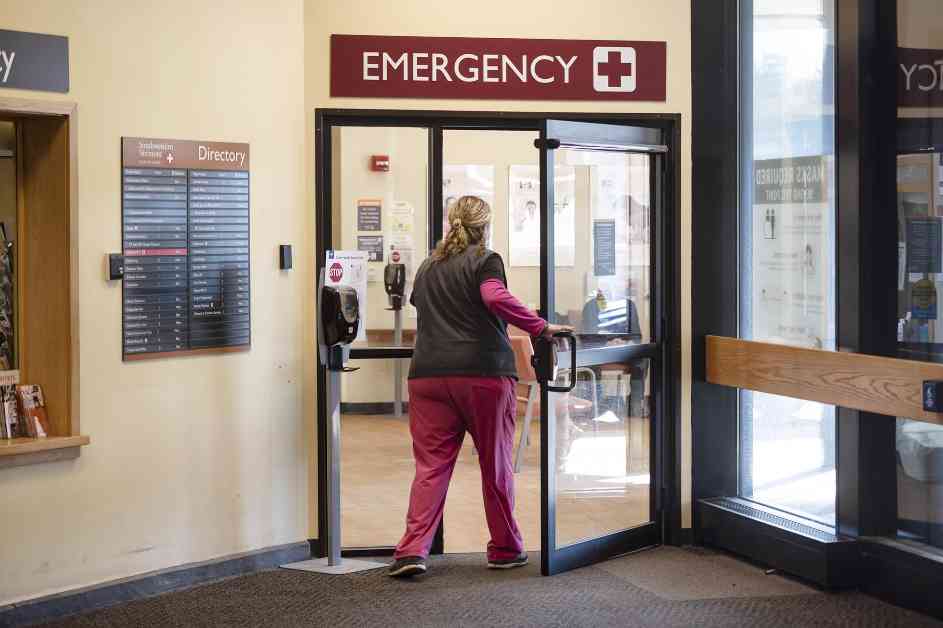Health Care Workers in Vermont Face Increasing Violence: Advocates Push for Better Protections
Violence in hospital emergency rooms has become a distressing norm, both in Vermont and nationwide. Liz Couto, a dedicated emergency department nurse and the chair of the Vermont Emergency Nurses Association’s government affairs committee, aptly described the situation as an “epidemic of violence.”
According to the U.S. Bureau of Labor Statistics, Vermont reported the highest rate of health care workers missing work due to violence in 2021 and 2022. Shockingly, the Vermont Association of Hospitals and Health Systems documented 89 incidents of violence and threatening behavior in hospitals between July 2023 and December 2024. More than half of these cases involved direct assaults on health care workers. However, as Couto emphasized, many incidents go unreported, shedding light on a grim reality faced by health care professionals every day.
In response to this urgent crisis, lawmakers passed Act 24 in 2023 to increase penalties for those threatening health care workers and facilitate law enforcement in arresting individuals who assault them. Despite this legislative effort, the issue persists. The House Health Care Committee is currently developing H. 259, a bill that aims to mandate hospitals to establish security plans for preventing workplace violence and handling aggressive behaviors. This bill would also require hospitals to collect data on incidents occurring within their premises. Training programs on defensive tactics, de-escalation, and crisis intervention would be implemented to equip hospital staff with the necessary tools to handle violent situations effectively.
Couto highlighted the need for standardized guidelines across Vermont’s hospitals, which currently operate under varying safety protocols. While discussing the proposed bill before the House Health Care Committee, Rep. Allen Demar, R-Enosburgh, questioned whether these measures were sufficient to ensure everyone’s safety. Couto acknowledged that the bill was a significant step forward in addressing the issue.
**Governor Plans to Veto Midyear Budget Tuneup**
The midyear budget adjustment bill faced a hurdle as Governor Phil Scott announced his intention to veto it upon reaching his desk. This would mark his first veto in the 2025 legislative session. A contentious point of debate revolves around Vermont’s motel voucher program for unhoused residents. Legislators have agreed to extend the program’s relaxed winter rules through spring, aiming to prevent a wave of evictions from the program set to commence on April 1. This extension comes with an estimated cost of $1.8 million. The fate of the bill now hangs in the balance as the ongoing debate unfolds.
**Senate Advances Bill to Protect Minors on Social Media Platforms**
Meanwhile, the Senate’s preliminary approval of S.69 signifies a step towards safeguarding minors against the addictive and harmful features of social media platforms. Dubbed the “Kids Code,” this bill proposes regulations for platforms like Tiktok and Facebook to modify their algorithms and default privacy settings for users under 18. The bill’s fate remains uncertain as it progresses through the House and awaits Governor Scott’s potential approval. Last year, Scott vetoed a comprehensive data privacy bill containing an earlier version of the Kids Code, citing other provisions as reasons for the veto. The strong show of support in the Senate suggests proponents may have the numbers to override a potential veto.
**House Delays Full Implementation of Vermont’s Raise the Age Initiative**
In another legislative move, the House preliminarily approved H.2, a bill that seeks to postpone the complete implementation of Vermont’s Raise the Age initiative for an additional two years. Initially, Democrats were eager to push forward with the juvenile justice initiative after multiple delays. However, following calls from Governor Scott and public safety officials to scrap the final phase of Raise the Age, lawmakers are now seeking a middle ground.
The proposed bill also aims to raise the age at which minors can be charged with juvenile offenses from 10 to 12. A Republican-backed amendment to eliminate the final phase of Raise the Age was rejected during the discussions, indicating a bipartisan effort to find a compromise.
**Conclusion**
In conclusion, the challenges faced by health care workers in Vermont shed light on a larger issue of workplace violence that requires urgent attention and legislative action. As lawmakers work towards enacting meaningful reforms to protect health care professionals, the ongoing debates surrounding various bills underscore the complexity and importance of addressing pressing social and public health concerns in the state. Stay tuned for further updates on these critical legislative developments.









